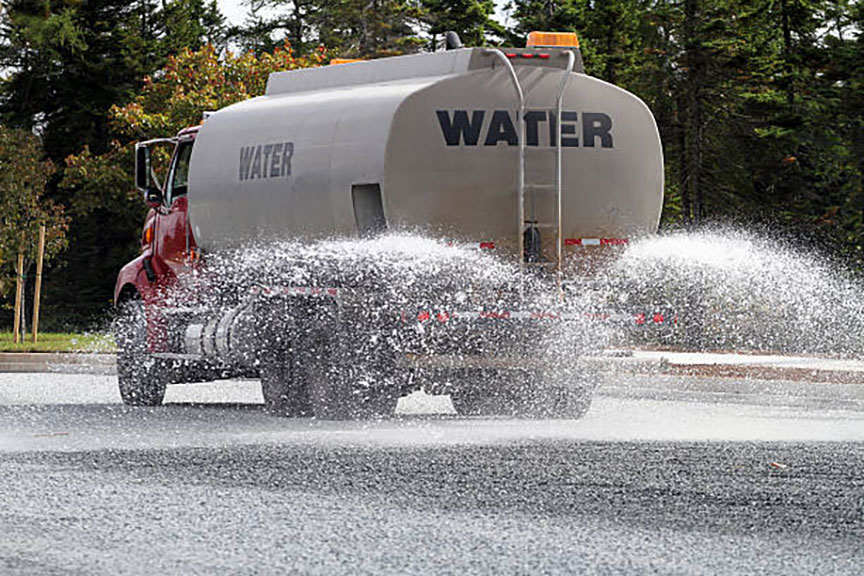Water sustainability became a pressing topic in 2020 as a record-breaking drought settled across the United States, almost covering the entirety of the country’s Western half with pockets in the Midwest and East Coast regions. The drought spanned from the same year through 2022 after winter precipitation was believed to have delivered the much-needed moisture. If life-need water supply is at risk, why would we think that water for dust control would be sustainable?
U.S. News reported that at its peak as many as 34% of Americans were believed to be living in severe drought conditions. The concern for water sustainability only heightened as the article went on to report that “55% of the population was [still] experiencing some level of abnormally dry conditions” during this period. Recently, Arizona restricted building permits in Phoenix due to its limited groundwater supply.
As a modern society, we are used to just turning on a faucet and summoning water the moment we want it. However, this most recent drought revealed a greater need for more responsibility as millions of households lost their ability to have unrestrained access to water. Perhaps one area we should consider is the industrial market, where water for dust control just no longer makes sense.
How Water Awareness Extends into the Industrial Market
Though not as obvious as its household purposes, water plays an equally important role in almost every industry. Whether its irrigating fields, extracting resources from mines, powering energy plants, or cooling products in a steel mill, water remains a critical component to industrial operations. The wide range of uses spanning from the domestic to the business sectors makes water sustainability an all the more significant subject to address.
Water for dust control persists as a mitigation method for far too many businesses. Though a common occurrence at many industrial sites, high volumes of loose fine particulate matter can have dangerous consequences. Whether its low visibility or looming chronic health issues for workers, dust is an obstacle many industries and federal agencies like OSHA try to limit through control and regulation.
One of the ways operations implement dust control is watering. The process of water for dust control opens the topic of water sustainability outside of the domestic. Watering involves spraying water over areas that produce these large clouds of dust. The water dampens the surface. As the particles congeal together, they become too heavy to lift from the surface, keeping dust stuck to the ground rather than floating in the air. However, industries who utilize this method are forced to run application sessions constantly due to how quickly the water particles evaporate, leaving the particles loose once more.
Water sustainability, among other issues, then arises because of such a high amount of watering. Not only does it halt operation, stalling productivity, but it requires hundreds or thousands of gallons of water with each session. When the water then inevitably evaporates, it seems as though this precious resource was used to accomplish nothing. Operators report that the dust particles appear even looser than before once the moisture evaporates entirely from the aggregate.
Using water for dust control, the structure of your roadways becomes compromised with the aggregates more susceptible to erosion at the onset of looser fines. Adding the factor of weaker roads, the need for constant reapplications of water for dust control points out the problem that is a huge waste of water.
So, while watering remains a traditional form of dust control, in actuality, it can leave your site worse with each subsequent watering.
Replace Water for Dust Control: Use a Sustainable Solution
Since Midwest’s beginning, we have always been mindful about sustainability, even before it became a mainstream concern. From our founding to today, we have been developing products aimed at effective dust control while being environmentally friendly.
In June of 2022, we explored the growing concern surrounding soil erosion in our article “Where Did All the Soil Go?”. Through this exploration, we examined how our fines preservation program stabilizes aggregate using native soils, preventing erosion without the additional harm posed by other harsh chemical solutions.
Then when it comes to water sustainability, Midwest brings that same emphasis on environmentalism using our EnviroKleen® product. This polymeric binder locks particulate matter to the surface of aggregate no matter the level of heavy traffic. Using the two-part patented system, EnviroKleen penetrates 2-3 inches into the soil to form a strong and rigid surface by locking particles down to the aggregate.
Just as EnviroKleen prevents soil erosion, it also plays a role in water sustainability. Part of its solidifying power seals in natural moisture, preventing aggregate from becoming dry and requiring constant reapplication like wetting. Once the product is applied, your operation no longer needs to rely on never-ending rounds of treatment that only waste water. EnviroKleen uses limited water that stays in place as soon its used, making it not just a dust control method, but also a form of water conservation.
The primary factor that makes EnviroKleen such an effective force for water sustainability and dust control alike it is chemical make-up. While its molecular structure keeps fines successfully suppressed, Midwest goes above and beyond to create an entirely customized system. Using samples from your natural aggregate, Midwest provides a product and application plan that will achieve your dust control goals. In other words, EnviroKleen is engineered to meet your specific needs.
With this level of precision, Midwest provides an all-encompassing solution that accomplishes dust control while benefitting the world’s goal for water sustainability. By choosing Midwest, you receive a product that’s not just effective, but mindful of our planet.

